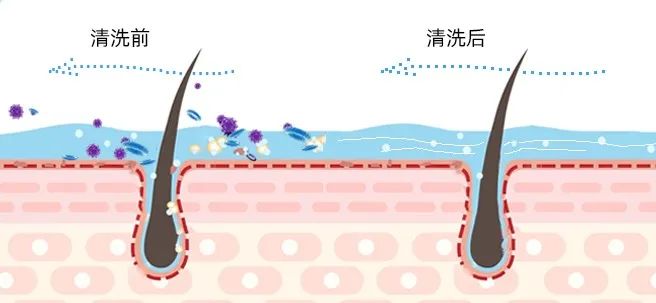Nasal congestion, runny nose, dry nose, itchy nose, sneezing... nose discomfort is really very uncomfortable. Especially the pain of rhinitis,
we all understand: nose blockage can not breathe, can only rely on the mouth; constantly blowing the nose,
all day and night can not be separated from the frantic wipe tissue ...
When your nose is uncomfortable, there is an inexpensive and useful method that is even recommended by several
new authoritative treatment guidelines: Nasal Rinsing.
Nasal rinses are a safe, effective and convenient way to aid in the treatment of nasal discomfort. What is 'nasal rinsing'?
And how to do it properly? Let's learn more about it today.

What is a 'nasal rinse'?

Nasal rinsing is medically known as 'nasal irrigation'.
The rinse is delivered to the nasal cavity with the help of a device. The rinse flows through the nasal vestibule, sinuses,
nasal tract and nasopharynx to cleanse the nasal cavity and treat the nasal cavity with medication through contact with the target tissue.


Effects of nasal irrigation

Physical removal
The nose is the first point of contact between the human body and the outside air, and the direct contact with the air makes it easy for bacteria to settle
in the mucous membrane of the nasal cavity and sinuses and proliferate under certain conditions to form biofilms.
One of the typical symptoms of rhinitis is the increase of nasal secretions, or what we call nasal mucus, which causes nasal blockage.
And nasal washing can remove the bacterial biofilm, allergens and secretions by physical means.
Restore cilia function
The surface of the nasal cavity has a particularly large number of cilia, which oscillate constantly.
The human nasal mucous membrane cilia can help our nose clean itself and keep it clear by oscillating.
When dust, bacteria, viruses, etc. enter the nasal cavity, they are blocked by the cilia and absorbed by the
mucous membrane, and the motor function of the nasal cilia is thus hindered.
Nasal rinsing can improve the function of nasal mucous membrane cells, promote the natural
oscillation of nasal cilia and restore the self-purifying ability of the nose.
Reducing the inflammatory response of nasal mucosa
Nasal congestion is often caused by inflammatory edema of the nasal mucosa.
Nasal washing can relieve the inflammation of nasal mucosa and reduce edema, thus effectively relieving our nasal congestion.

Which symptoms need to 'wash nose'

Acute rhinitis
'Acute rhinitis' is also commonly known as a cold.
Washing the nose when you have a cold can remove nasal secretions, reduce nasal mucous membrane congestion, and relieve nasal congestion and other symptoms.
Allergic rhinitis
'Allergic rhinitis' is also known as allergic rhinitis. Seasonal allergic rhinoconjunctivitis caused by pollen allergy is also called hay fever.
Dust mites, wormwood, ragweed and dandelions are also common allergens.
Patients with allergic rhinitis can relieve the symptoms of rhinitis by washing the nose and also washing away the allergens in the nasal
cavity, thus reducing the stimulation of the nasal mucosa by allergens and controlling the development of allergic rhinitis.
Sinusitis
Nasal washings are more commonly used clinically for sinusitis patients and are used throughout all stages of sinusitis to
flush out purulent secretions, which can significantly improve the symptoms of nasal congestion.
Multiple nasal discomfort
It is used to cleanse and care for nasal problems such as runny nose, itchy nose, sneezing, nasal congestion, nasal dirt,
nasal bleeding, etc. It moistens and repairs the nasal cavity and gives lasting care to the nasal cavity.
*It is also suitable for people working in extreme environments, such as coal mining, construction,
sanitation and cleaning, who need to keep their nasal passages clean.

How to properly 'cleanse' the nasal cavity?

Choice of nasal rinse solution
Nasal rinse solution is generally divided into two types: isotonic and hypertonic: the hypertonic type is therapeutic and is usually used
when the nasal mucosa is swollen and rhinitis is serious; the isotonic type is mostly used for daily cleaning care.
What we often call saline (0.9% sodium chloride solution) is isotonic solution. Sea saline is a blend of processed sea salt,
which contains minerals and trace elements in addition to sodium chloride.
Choice of nasal washer
The common nasal washers nowadays are manual nasal washers and electric nasal washers.
Manual nasal washer: squeeze type
Generally refers to the manual squeeze type nasal washer, cleaning fluid from one side of the nostril into, the other
side of the nostril out, centralized water column rhinorrhea is easy to choke the nose, and the saline needs to mix their own,
the concentration is difficult to control, a pinch a spray, the water is also unstable.
Electric nasal washer: spray type
Using the venturi principle, the nasal wash is atomized into a steady spray of >10μm by air pressure jets, which is
delicate and gentle, mild and non-irritating, and cleans every corner of the nasal cavity in a comprehensive and deep way.
Flow 11 Electric Spray Nasal Washer
Fine mist, very friendly to nasal passages
Perfect for
People with nasal discomfort
Variable Frequency Dual Pulse
Deep cleaning of the posterior nasal chamber and sinuses
Fully cleans sinusitis and nasal polyps
No nasal choking
Mild and non-irritating
Try it if your nose is uncomfortable!
Use with feellife nasal wash
Mild nasal wash without hurting the nose
Cleaner nasal passages
Long-lasting care for delicate nasal cavities and susceptible nasal passages!
Nasal discomfort is prone to recurring problems. In addition to medications, surgery and other treatments,
salt water with an electric spray nasal washer for washing is a good daily care method.
However, it is important to note that washing the nose is only part of the treatment for rhinitis and cannot replace the appropriate medication.
If you have a recurring rhinitis, you still need to go to the hospital and take medication according to your doctor's orders.